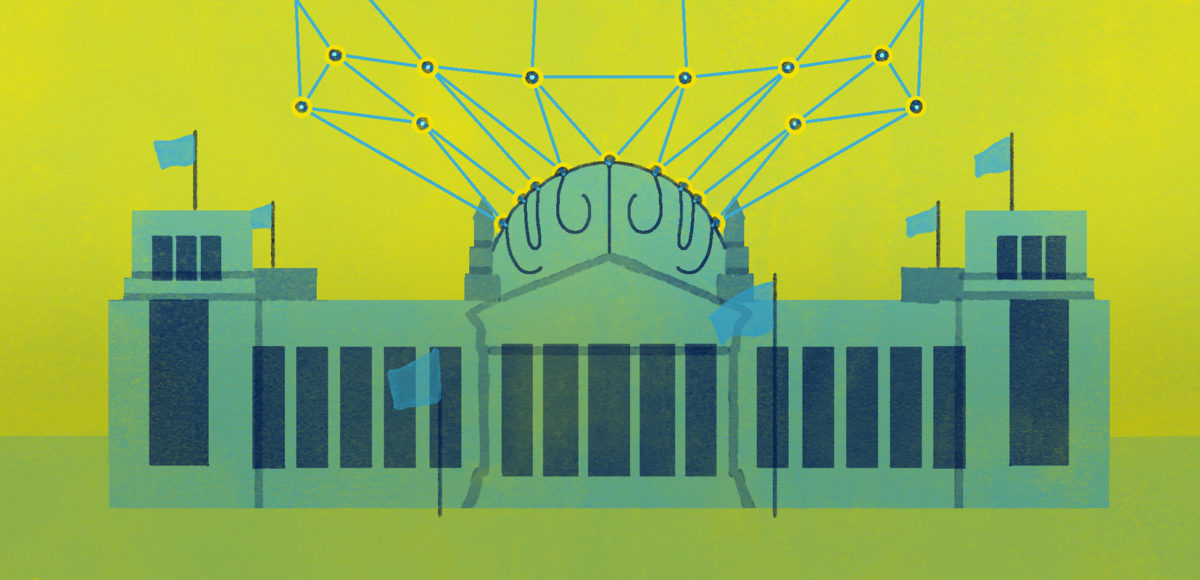By Christoph Bieber
My take on artificial intelligence roots in the perspective of a political scientist. For a better understanding of the manifold impacts, AI systems will have on public communication, administration and society, we should use the common differentiation into the realms of politics, policy, and polity. In my view, there will be an impact of artificial intelligence in all three dimensions of “Politik”.
Let’s start with politics, which includes the day-to-day competition (or, at least sometimes, cooperation) between political actors during parliamentary routines or when it comes to elections. I think that AI systems, in the form of automated learning, or algorithmic decision systems soon will be integrated into various forms of political communication (in some cases they already are, and you don’t necessarily need to focus on experiments with facial recognition). In the near future, AI systems might help to develop and build up voter opinions – in one of the next election cycles common tools for voter advice will have to compete against automated “robo-advisors” that inform citizens about their “political needs” and which party or candidate serves them best. We already experience the influence of bots, automated messaging and algorithmic structuring of personal timelines in today’s social media platforms. Soon, AI systems will play an even more important role in setting the agenda as well as tools for running campaigns. Furthermore, they are likely to be included in various modes of digital participation, as these processes are already supported by digital platforms fostering citizen communication and optimizing the exchange with government agencies.
During the next few years, the AI will play a significant role as an issue in its own right – it already has entered the arena in various policy fields. Security policy has long taken up the discussion on autonomous military drones, health policy has recognized the advantages of AI systems for medical imaging, insurance companies are developing “responsive” products based on predictive health analytics; the field of consumer policy takes into account data-based models of dynamic pricing, infused and supported by AI systems. All of those policy fields, and some more, such as transport, energy or technology policy conceive AI as a relevant topic and try to make some sense of it in their very own perspective. My – slightly – educated guess would be that after the next general election in Germany (which is scheduled for autumn 2021) there will be the establishment of a Federal Ministry for Digitization. There is a – more or less – lively debate about this topic, we have been talking about that for five, ten, or maybe even fifteen years. I think in 2021 there will be such a government agency in Germany. And it is very likely that there will also be some kind of “AI hub” for formulating AI-related policies.
In the near future, AI systems might help to develop and build up voter opinions – in one of the next election cycles common tools for voter advice will have to compete against automated “robo-advisors” that inform citizens about their “political needs” and which party or candidate serves them best.
From the political science point of view, this is a rather rare process. There is a limited set of policy fields that are long-standing, such as fiscal policy, economic policy, social policy, security policy, and so on – those areas include a more or less closed set of actors, cultivate institutional surroundings, usually lead by a government agency on the federal level. It doesn’t happen very often, that a new policy field arises, steps into the political arena – and stays there, changing the status quo. Environmental policy might be a recent example, but that was already about 40 to 45 years ago – and still, from the research perspective it is considered to be a young policy field (right now at least partly transforming into the even broader climate policy). So, we probably will have to wait a while, but I am quite sure that there will be a consistent digital policy in its own right.
To some extent, we are just about to enter the AI age in different areas of the political system. Especially when it comes to technology, it usually takes a while, until political actors react to innovations and include disruptive developments in their policy-making routines. Right now, there is still an AI summer in the political realm, and that’s for a reason. A lot of people working in politics evaluate his or her benefits of becoming an expert in AI politics: Is it good for my career? Does an AI-friendly profile help me in my constituency, can I build up a recognizable personal brand around that topic? Does it help to earn spots in legacy and digital media environments? Does it even help me while running for office? This dynamic will probably hold on for a while, and the establishment of new institutions with the power to formulate strong policies will help to strengthen and stabilize this policy field.
The third dimension, we have to take into account is, of course, polity. This is the dimension that includes values and norms, that are considered to be relevant for the formation and development of society in general, but also for the daily routines of political actors. Interestingly enough, this is an area where a few things are already happening in Germany and especially in Berlin. During the last two years, a couple of new advisory boards and committees have been established, dealing with aspects of AI-related innovation and their impact on society and politics. For instance, there is a Data Ethics Commission set up by the Federal Ministry of Economics, discussing the necessity to implement a set of ethical rules in AI systems. Also, the German Bundestag has its own advisory council, the Study Commission on Artificial Intelligence. Here, members of parliament exchange their positions and ideas with external experts from various fields, such as AI-related companies, lobbying organizations, civil society, and science.
Right now, there is still an AI summer in the political realm, and that’s for a reason. A lot of people working in politics evaluate his or her benefits of becoming an expert in AI politics: Is it good for my career? Does an AI-friendly profile help me in my constituency, can I build up a recognizable personal brand around that topic?
In addition to the expert commissions founded on the federal level, similar things happen on the state level in Germany: many states have designed AI strategies (or are right now working on them), focusing on special needs and demands of the respective regions. This gives rise to the interesting question of what might be the best strategy for facing the upcoming challenges with AI regulation and policy-making. Where do we get by combining ideas and strategies developed on different administrative levels? Can competition between state and federal agencies help to create a productive environment for political innovation? Or will those initiatives neutralize each other in the end? Definitely, the next years will be formative for the area of AI-related politics in a broad array of AI-related policies.
And still, there is a good chance, that the national level is only a minor playing field for developing AI-related policies – similar to policies aiming on the regulation of digital markets or social media platforms, Artificial Intelligence raises questions that will be discussed (and, hopefully, solved) on a global level. Following this route, my final guess would be, that in the mid of the new decade there will be an EU Commissioner exercising political leadership on AI-related issues. Already now it is interesting to follow the various AI-initiatives of the member countries, as they might be indicators, who will take on a leading role in AI-related policy-making on the EU level.
From a Political Science point of view, it is very exciting to look at all the current initiatives, but one also has to be careful and must not become an academic hype-rider. During the next few years, there will also be some significant decisions about the “division of scientific labor”, when it comes to AI-related research. Right now, Computer Science, Informatics, and the rising field of Data Science seem to dominate research on AI-related topics. For the future of society, it will be of great importance, that also the Social Sciences and the Humanities are included substantially in research initiatives. Right now, Artificial Intelligence indeed might be a technology-centered research issue, but it is clear that the future of society, or even mankind, is dependent on research activities that take the “conditio humana” into account.

 | Technology, AI and ethics.
| Technology, AI and ethics.

